When you purchase hosting from InMotion, you can enable free AutoSSL. This allows you to access HTTPS on your domains. This is included with ALL their hosting plans. Here’s the complete InMotion hosting discount list.
Don’t purchase hosting without a free SSL certificate!
Including free InMotion SSL is important because many companies try and gouge you on the price of SSL while offering cheap hosting. It’s one of the two traps hosting companies use to get you to overpay.
No Wildcards With InMotion’s AutoSSL – But That’s Ok!
Unlike SiteGround, InMotion’s AutoSSL doesn’t support wildcards. So if your website was “example.com”, the following subdomains will be covered by each AutoSSL, namely:
- autodiscover.example.com
- example.com
- cpanel.example.com
- mail.example.com
- webdisk.example.com
- webmail.example.com
- www.example.com
However, this doesn’t matter since InMotion creates a separate AutoSSL certificate for each subdomain, as per this tweet:
I’ve been saying for a long time that in this day and age, you don’t NEED to pay for SSL. Hosts should be giving them out free at this point, and InMotion’s AutoSSL delivers the goods with individual certificates for each subdomain. Cool!
So let’s see how to Enable free AutoSSL with InMotion.
Step 1: Find the Option in InMotion’s AMP
When you log into your InMotion account, you see the “Account Management Panel” or AMP. Unlike DreamHost, InMotion uses a standard cPanel interface, so AMP isn’t a replacement. In AMP, locate the icon titled “Manage Free Basic SSL” like this:
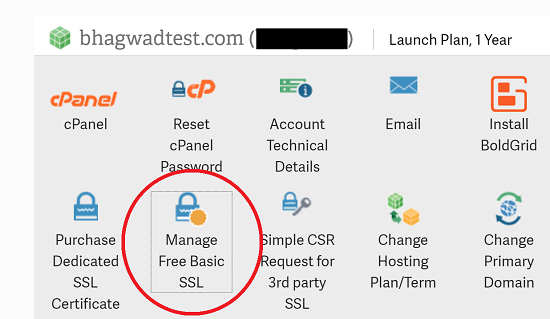
Step 2: Enable Free SSL and Wait for Confirmation
This will bring you to a page with a toggle button labeled “Enable Free SSL”. Click it so the slider turns green, as shown here:
This will generate the SSL certificate.
Certificate Generation Process
However, it doesn’t happen immediately. If you try and visit your website as soon as you enable AuotSSL, you’ll get a certificate warning like this:
Creating an SSL certificate is a time-consuming process requiring the creation of sufficient randomness or “entropy” for the key to providing solid encryption. For this reason, InMotion generates these certificates at night when the server load is low.
However, manually enabling AutoSSL, as we did above, can force the process along. InMotion recommends that we wait for a maximum of 20 mins for them to generate the certificate, but the process usually takes around half that time. When your certificate is generated, you’ll get an e-mail from cPanel informing you about it:
This will also list the subdomains which AutoSSL protects.
AutoSSL Expiration Dates
At the bottom, you can also see the expiration dates. However, you don’t need to worry about it renewing it manually since InMotion does this for you automatically. It’s one of the reasons why I don’t usually recommend installing a certificate manually – even though it’s possible. With an automated SSL procedure like this, you’re never in danger of expiring certificates.
Step 3: Testing the Free AutoSSL Functionality
After you receive the e-mail from cPanel, which notifies you that your SSL certificate has been installed, try and visit your site with “https” instead of “http”. You should now get a nice green “lock” signal in your browser bar like this:
And you’re done!
InMotion Should Switch to Let’s Encrypt Certificates
In short, AutoSSL from InMotion is almost as good as the Let’s Encrypt certificates issued by hosts like SiteGround. The only drawback is that it doesn’t secure wildcard domains. And that’s a pretty big drawback!
Considering that even slow-moving lumbering EIG companies like Bluehost are now using Let’s Encrypt, it’s time that InMotion switched over. Or they can fix the wildcard loophole in their AutoSSL offerings. Until then, customers can at least secure their base domains with free SSL without purchasing one.
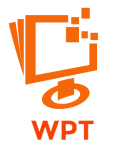
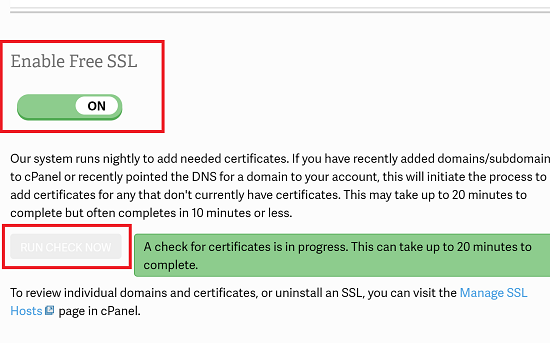
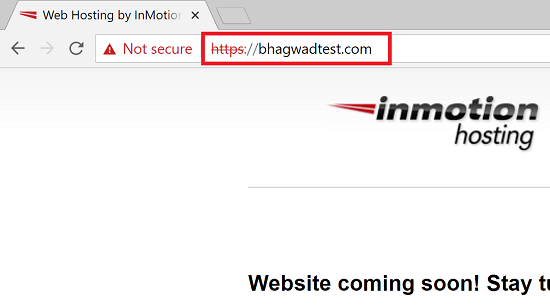
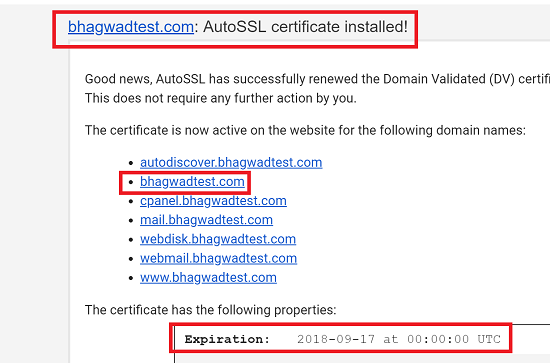
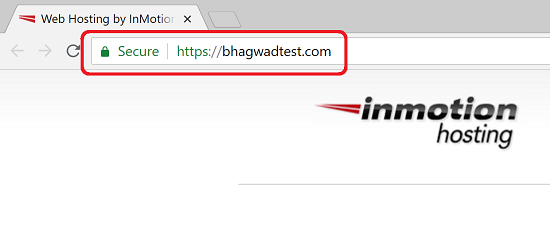
Speak Your Mind